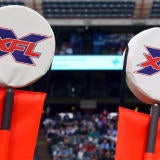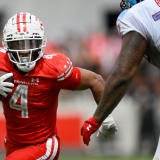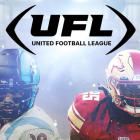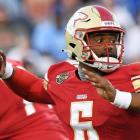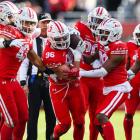By now, you've probably watched at least some of the XFL, the reborn spring football league that kicked off its season the weekend after the Super Bowl. The first version of the XFL lasted just one year (shouts to 2001 XFL MVP Tommy Maddox), and while the jury is still out whether this iteration will have a longer shelf life, there are several twists in the new XFL that have made the game worth checking out. That includes tweaked rules on kickoffs and extra points, more transparency on replay reviews and official discussions, and the ways in which telecasts and analysts incorporate gambling information into the experience.
I'm here to talk about that last point: gambling. Through a combination of research and luck, I've managed to dominate the first four weeks of the XFL season, going 14-2 against the spread. That includes 4-0 records in Weeks 1 and 3 and 3-1 records in Week 2, where I just missed another 4-0 on a garbage-time touchdown that didn't affect the winner of the game but did swing the ATS result, and Week 4, where I made my first truly awful pick in selecting the Defenders -1.5 in a game they went on to lose 25-0.
Coming off my first disastrous pick of the year, now seems like the perfect time to share why I believe I've managed to have success forecasting a league that had zero historical data to work with. While I can't lay out a complete gameplan that perfectly explains my process -- though if you really want some extracurricular homework, I'm currently reading the book "Superforecasting: The Art of Science and Prediction" by Philip E. Tetlock and Dan Gardner and found that many of the ways they describe the superforecasters from their geopolitical prediction contest line up with how I approach sports gambling -- I can share some tips that might help you moving forward.
If you're just looking for this week's predictions, you can head over to SportsLine and check out my Week 5 XFL picks. Will the scorching hot streak continue?
1. Be lucky
OK, this first tip isn't going to help much on its face, but it has to be acknowledged that it was never etched in stone that I'd go 14-2 with these picks. Though I mentioned being unlucky in Week 2, I've also had my fair share of luck as well. In Week 4 I had the Roughnecks as a 2.5-point favorite and only managed the cover thanks to a sack-fumble touchdown. I faded the Vipers as road favorites in each of the first two weeks and won, but they outgained their opponents in yardage by a large margin in each game only to go 0-for-7 in the red zone. They've been 4-for-6 in the red zone the past two weeks, and if that success had manifested in their first two games, I would have missed at least one of those picks. And the examples go on.
While you can't very well just choose to be lucky, I wanted to include this at the top so that you realize that the final score of a football game is not predestined. Any number of factors can affect the scoreboard, and it's important to assess the underlying data from a game independent from what the final score said. The Guardians held the Vipers to just three points in that Week 1 matchup, but their defense gave up the second most yards per play in the league in that opening week. They went on the road the next two weeks and gave up 27 and 29 points.
2. Dive into the data
Here's where most of my work comes in during the NFL season, leaning on data to paint a picture of an upcoming matchup, which helps to understand the ways in which a game is likely to transpire. Unfortunately, XFL stat databases were virtually nonexistent after the first weekend of games, so I created my own.
I can tell you that the Roughnecks lead the league in yards per play both on offense (5.86) and defense (4.47), but due to their style of offense, teams run more plays against them (71.5 combined pass and rush attempts per game) than any other defense. Conversely, the run-heavy attacks of the Vipers and BattleHawks mean teams run the fewest number of plays against their defenses (45.8 and 49.3, respectively).
I've set up a spreadsheet where I can log the box score data from each game at the end of the weekend and have it calculate updated stats like yards per play, yards per pass attempt and rush attempt, sack and interception percentages, third down and red zone conversion rates, point after conversion rates and aggression data (whether they go for 1, 2 or 3), and so on. And it all helps inform a prediction; one of the reasons I took the Dragons +12 at the BattleHawks last week was because their defense owned the best tackle for loss percentage on run plays in the league, and I thought that made a difference against a St. Louis team that is extremely run-heavy. The Dragons racked up eight tackles for loss while holding BattleHawks to a season-worst 2.89 yards per carry en route to losing by just seven points. Without unearthing that statistic, I can't tell you that I would have liked Seattle as much as I did.
3. Location, location, location
A couple different tips to relay here. First, these eight teams are spread across the country, with three basically on the East Coast and two on the West Coast. That absolutely matters. These mostly aren't longtime NFL veterans who are used to the rigors of an NFL travel schedule, and many of these guys played in colleges in conferences that stayed relatively local. Each week has featured one matchup where a team had to travel cross-country, and the road team in those games is 0-4 ATS, including the Wildcats losing outright as big favorites at New York this past week and the Defenders losing outright as big favorites at Los Angeles the week prior. Clearly the travel factor isn't being priced into these matchups yet.
The other reason to take note of the location of a game comes with evaluating a team's recent performance. The Defenders faced two of the bottom-tier teams in the league in the first two weeks, both at home, and one had to travel cross country. They were set up to win those games and did so handily. But then they had to travel cross country to face a Wildcats team that was better than its 0-2 record due to the recovering health of quarterback Josh Johnson. Taking the Wildcats in that spot as massive underdogs was an easier call than most. Be careful not to draw sweeping conclusions about a team without factoring in where they've been playing their recent games.
4. Stay informed until kickoff
I submitted my picks to SportsLine early in the week, but I also monitor injury and practice reports as the week goes on knowing that situations can change. I'm never 100 percent confident in any prediction I make -- in any sport. Just go back and reread No. 1 above to understand why. It's impossible to be so. Football is a game of lucky or unlucky bounces, and variables you can't possibly know will affect the outcome. If I'm on one side of the spread, what I'm really saying is that I believe that side has better than a 50 percent chance of cashing after I've taken into account all the possible outcomes.
And which team is on the right side of that 50 percent marker can change. In Week 3, I initially liked the Vipers as six-point home 'dogs against the Roughnecks early in the week, but at a confidence level just north of 50 percent. Based on how their offense looked in Week 1, I thought if Aaron Murray came back, they'd have a shot to cover against a Houston team that hadn't left home yet at that point of the season. Once Murray and key target Nick Truesdall were ruled out, I switched my prediction to the Roughnecks covering as then 6.5-point favorites, which I had just over 50 percent confidence in under the new circumstances. Houston ended up winning by seven points.
In the Westgate SuperContest -- the biggest NFL betting competition in the world where you select your five strongest picks each week during the regular season -- oftentimes the teams I end up taking as my fifth and even fourth picks have a lot to do with the final injury report released on Fridays. Injuries matter, as they can reduce strengths or turn them into weaknesses. Be ready to adjust your thinking on the fly if circumstances change.
Again, more goes into making picks than just the tips above. I happened to think the Vipers were overrated heading into the season based on their talent and coaching, and that turned out to be the case (though again, those first two weeks could've gone much differently). I thought Landry Jones would be healthier than Josh Johnson heading into their Week 2 debuts, and it was a determining factor in taking the Renegades on the road, but it was an educated guess more than anything. I trusted Luis Perez to come in and do enough on offense for the Guardians to cover in Week 4 despite how terrible the team had looked the previous two weeks; while the Guardians were outplayed, they did manage to get the win with Perez looking like an upgrade from Matt McGloin.
So yes, I've made some great calls over the first four weeks. But I've also been fortunate to go 14-2; if we were to guess what my record would be over the next four weeks, I doubt anyone (and certainly not I) would predict 14-2 or better. My personal goal is to try and hit two-thirds of my remaining picks to finish the year 30-10, but if you had asked me that same question heading into Week 1, I would have been thrilled to finish the year 24-16 with a 60 percent success rate.
Maybe that's where I ultimately end up, maybe even worse. No one can predict the future.

